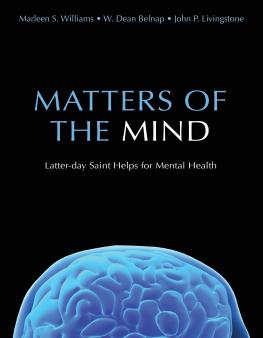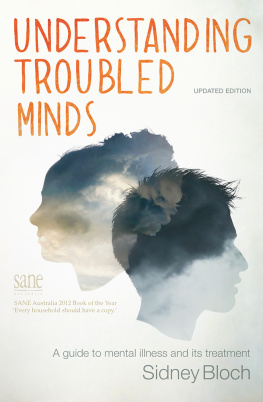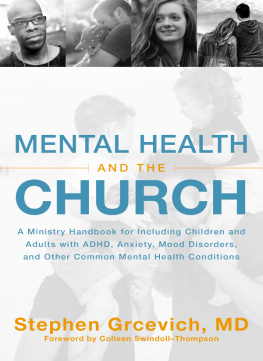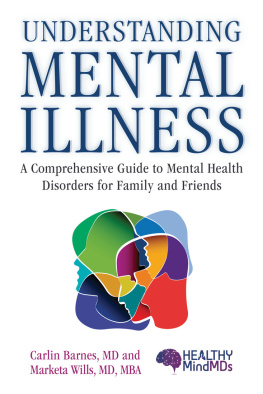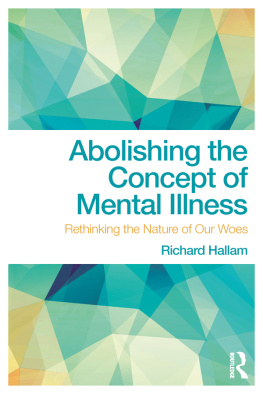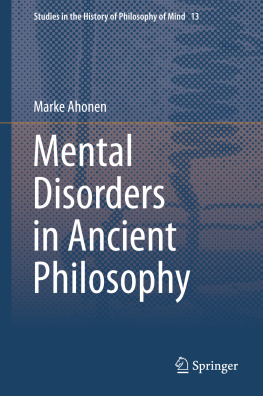Sommaire
Pagination de l'dition papier
Guide
GRACE
for the
AFFLICTED
A CLINICAL AND BIBLICAL
PERSPECTIVE ON MENTAL ILLNESS
REVISED & EXPANDED
MATTHEW S. STANFORD
InterVarsity Press
P.O. Box 1400, Downers Grove, IL 60515-1426
ivpress.com
Second edition 2017 by Matthew S. Stanford
First edition 2008 by Matthew S. Stanford
All rights reserved. No part of this book may be reproduced in any form without written permission from InterVarsity Press.
InterVarsity Press is the book-publishing division of InterVarsity Christian Fellowship/USA, a movement of students and faculty active on campus at hundreds of universities, colleges, and schools of nursing in the United States of America, and a member movement of the International Fellowship of Evangelical Students. For information about local and regional activities, visit intervarsity.org.
All Scripture quotations, unless otherwise indicated, are taken from the New American Standard Bible, copyright 1960, 1962, 1963, 1968, 1971, 1972, 1973, 1975, 1977, 1995 by The Lockman Foundation. Used by permission.
While any stories in this book are true, some names and identifying information may have been changed to protect the privacy of individuals.
Cover design: Cindy Kiple
Interior design: Daniel van Loon
Images: orchid in broken bottle: Jose A. Bernat Bacete / Getty Images
Images: broken glass: matejmm/iStockphoto
Images: white orchid: pilotL39/iStockphoto
ISBN 978-0-8308-9080-4 (digital)
ISBN 978-0-8308-4507-1 (print)
This digital document has been produced by Nord Compo.
PREFACE
SINCE THE PUBLICATION of Grace for the Afflicted in 2008, significant changes have occurred both in my personal life and in the mental health care system. Ten years after its publication, I find myself in full-time ministry and part of a national conversation on the role of faith communities in mental health care. This has given me the opportunity to meet and talk with thousands of individuals around the country who live with mental illness and their families. Those conversations have given me greater insight into the topic and a better feel for the role that faith communities might play in the lives of those broken by mental health difficulties and disorders.
Within the mental health community, the publication of the fifth edition of the Diagnostic and Statistical Manual of Mental Disorders (DSM-5) in 2013 dramatically changed how mental disorders are classified and diagnosed. These two factors have led me to revise and expand Grace for the Afflicted.
This new edition is consistent with DSM-5 diagnoses and includes updated neurobiological and treatment information on all disorders. There is a new section on neurological disorders (e.g., dementia), more examples and discussion of madness and mental health problems in the Bible, and new chapters on suicide, bipolar disorders, and trauma. Finally, I have included step-by-step information for setting up a holistic mental health recovery plan and a detailed guide on equipping congregations to better serve those living with mental disorders and their families.
These changes have been made so that Grace for the Afflicted might continue to be helpful for those ministering to the least of these.
SECTION ONE
PSYCHOLOGY, PSYCHIATRY,
and FAITH
FEARFULLY AND
WONDERFULLY MADE
The Spirit of God has made me,
And the breath of the Almighty gives me life.
JOB 33:4
THE SCRIPTURES TELL US that in Christ we have everything we need for life and godliness, correct? So can you explain to me why Annas bipolar disorder and her dependence on medication is not an issue of weak faith or sin?
Only two of us stayed after the church meeting that morning, talking over coffee. I was a deacon in the church at the time, and the man who asked the question was a friend and respected elder. The question took me by surprise, and initially I was speechless. If you have a loved one with a mental illnessor you yourself struggle with the debilitating symptomsyour first reaction to such a question may have been more along the lines of sadness, disgust, or anger.
But in my friends defense, he sincerely wanted to understand something he saw as alien and frightening. Was Anna sick, or was she spiritually weak? We know from 2 Peter 1:3 that we do have everything we need for a godly life (NIV). Yet, even though Anna professed Christ as Savior, her life was a mixture of family problems, shame, suffering, and strange behavior. How should the church respond?
Mental illness is a frightening experience, not only for the one afflicted but also for those who witness the individual struggling to control strange thoughts and behaviors. In the United States one out of every five adults (18.6 percent of the population) suffers with a mental disorder in a given year. I believe that the first step in understanding how to effectively minister to and support someone living with mental illness is to recognize how God has created us.
How Are We Created?
We are fearfully and wonderfully made (Psalm 139:14), created in the very image of God (Genesis 1:26). Humans are complex beings, unlike any other living creature: the union of a physical body with an immaterial (nonphysical) mind and spirit. Jesus himself describes the complexity of the self in Mark 12:30-31. When asked about the greatest of all the commandments, Jesus, quoting Deuteronomy 6:5, responds by saying, LOVE THE LORD YOUR GOD WITH ALL YOUR HEART, AND WITH ALL YOUR SOUL, AND WITH ALL YOUR MIND, AND WITH ALL YOUR STRENGTH.... [AND] LOVE YOUR NEIGHBOR AS YOURSELF. In other words, love God with all aspects of your being (your whole self) and through your relationships.
The four facets of the self are clearly outlined in Luke 2:52. Describing the development of the young Christ, Luke writes, Jesus kept increasing in wisdom [mental] and stature [physical], and in favor with God [spiritual] and men [relational]. So you and I, like the incarnate Christ, are a unity of physical, mental, spiritual, and relational facets, with each aspect affecting and being affected by all the others.
Physical. We exist in a physical body so we can interact with the material world around us. Our bodies have been specifically designed to take in information from the environment and relay it to our brains. We see, hear, taste, smell, and touch the world around us. The processing of sensory information by our brains produces thoughts, feelings, and emotions, which then result in some outward behavioral display. We are Gods creative masterpiece: a miracle of skin, bone, and blood formed from the dust of the ground (Genesis 2:7). But at the same time we are so much more. We reason, we love, and we pray.
Mental. Are our thoughts, feelings, and emotions merely the product of neurochemical changes and electrical discharges in our brain? Or is our mind something moresomething immaterial, more than the sum of our parts? The truth is probably somewhere in the middle. While the functioning of our brain is integral to the existence of our mind, that alone is not sufficient to explain it. Similarly, to imagine our mind as completely separate and unrelated to the brain doesnt seem correct either. Body and mind are intimately connected, each affecting the other. We retrieve a past memory of a fearful event in our mind, and our physiology reacts with a racing heart and sweaty palms. Our sensory receptors are activated by familiar stimuli in the environment and past thoughts, and feelings rush to consciousness.



